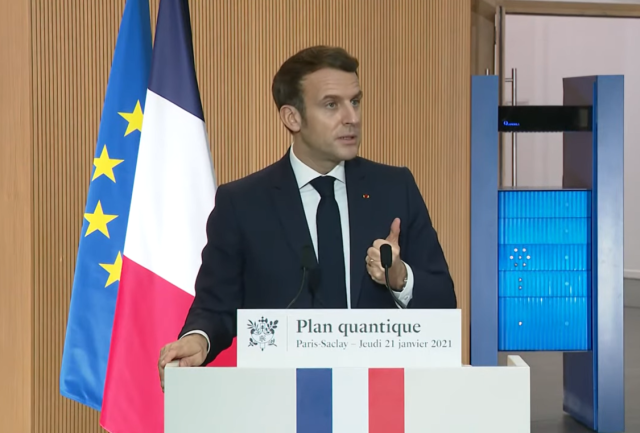Macron commits 1.8 billion euros to put France at the front of quantum computing
While the battle for Artificial Intelligence seems lost against the Chinese and American giants, the next breakthrough in quantum computing is still to be discovered, and France will not be left behind.
1.8 billion euros for Quantum
On the 21st of January 2021, French President Emmanuel Macron presented a new plan that would position France at the forefront of quantum computing. A total of 1.8 billion euros has been earmarked for the project on the Saclay Plateau which will be made available at a rate of 200 million euros a year with the aim of spearheading development of the next revolution in computing. France lagged behind on Artificial Intelligence leaving AI firmly in the grasp of Chinese and American tech giants, which led to many French academics and researchers leaving the country. With this development plan Macron hopes to position France as a key leader in quantum computing and prevent the same brain drain from occurring again.
Why the hunt for quantum computing is so important
Current electrical computers are limited by the speed of electrons in matter. By minimizing the distance an electron needs to travel, such as by shrinking the transistors, incremental speed improvements can be made up to a finite limit. Electrical engineers and physicists alike have been working on technologies for quantum computing where information is carried by photons rather than electrons.
Quantum computers can theoretically offer much faster processing times. However, quantum computing also takes advantage of so-called ‘quantum weirdness’ like indeterminism to help solve problems. While a classical computer works with bits that must be 0 or 1, quantum computers work with indeterminate qubit states that are simultaneously 0 and 1. As quantum operations can be performed on these qubits directly they allow for far greater possibilities when problem solving and they have the ability to solve problems that classical computers cannot. In 2019 Google’s 53-qubit programmable superconducting processor made news when it outperformed any classical computer in the world. China followed this up with a 62 qubit processor. Having the potential to solve previously unsolvable problems like the travelling salesman, the technology is widely regarded as the next big step that will revolutionize computing. It is no surprise so many companies and nations hope to be the leaders of this technology.
Hedging bets on what the breakthrough will look like
Macron’s plan is to create an intensive research and development effort to find and develop technology that could get to the market within five years. This is no small task, especially as it is not clear which kind of quantum computing will become the dominant technology. While many bets are on superconducting processors that operate at temperatures close to absolute zero, photon-based systems that ‘bounce’ photons into quantum states using mirrors, trapped ion systems and even silicon-based systems are all viable candidates. It could even be that multiple systems make breakthroughs, each one tailored to a specific niche.
Could startups provide the breakthrough?
Marcus Pflitsch, cofounder of Swiss Quantum Technology company Terra Quantum says that brainpower is the limiting factor in quantum computing research, not money. If startups have the right staff they could compete with larger players in the race for the next breakthrough. In fact, big advances in quantum computing have been made by relatively unknown teams across the world, and the startup culture appears to now be attracting seasoned professionals along with newcomers. John Martinis, the lead scientist who built Google’s quantum computer recently moved to a 2017 Quantum Computing startup, and other high profile scientists have made similar moves.
Macron’s new Quantum Plan will provide a framework for French industrial and research forces to make progress. This in turn should attract bright minds within the region, and make the country a key player in the upcoming quantum technology revolution where everything remains to play for.
Sources: eetimes.eu – Hebergementwebs.com

















There are no comments
Add yours